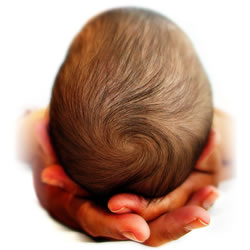Infantile Acne
Infantile acne is a clinical type of acne which occurs only in the early months of life. However, infantile acne is not responsible for all cases of acne in babies, which can also occur as a result of other clinical types of acne, including drug-induced acne, occlusion acne and adolescent acne. It needs a bit of explaining why a baby can suffer from adolescent acne, but a teenager cannot suffer from infantile acne.
Infantile Acne versus Baby Acne
Infantile acne is a clinical type of acne, which means that a diagnosis of infantile acne is the conclusion of a clinical examination and discussion of the baby's medical history with the parent or carer. In contrast, baby acne is part of the classification of acne based on the distribution of acne in different age groups. Any baby with acne can be described as having baby acne - the term ‘baby acne’ implies nothing about the cause or clinical presentation of the condition. Thus far, the relationship between infantile acne and baby acne is directly comparable with that between teenage acne and adolescent acne. However, there are two important differences which become apparent when one considers the diagnosis and causes of infantile acne.
Diagnosis of Infantile Acne

The diagnosis of infantile acne is a clinical one, but is in large part a diagnosis by exclusion. Infantile acne may be present at birth or develop in babies during the first few months of life. The diagnosis is restricted to neonates and young babies - it is important that new cases of acne in older babies or young children are not treated simply as infantile acne, but that a correct clinical diagnosis is made by a doctor. In most cases of infantile acne, usually only a few small comedones, characteristic spots seen in acne, develop on the baby's skin. However, some babies develop a severe form of acne which may persist for many months. It is important in cases of persistent or severe acne in babies that other clinical types of acne, particularly adolescent acne in association with precocious puberty and drug-induced acne, caused by the use of certain over-the-counter and prescription medicines, are excluded.
Causes of Infantile Acne
The cause of infantile acne is not known, which is why the diagnosis must be one of exclusion. The occurrence of acne in a baby of an appropriate age, who is not suffering from another clinical type of acne, results in the diagnosis of infantile acne. Infantile acne is the only clinical type of acne for which the cause remains unknownAt present, the condition is the only clinical type of acne for which the cause remains unknown. It is likely that a cause for infantile acne will be discovered in the future or that it will be found to be attributable to one of the other existing clinical types of acne. There has been some speculation that infantile acne may be a type of hormone induced acne or occlusion acne resulting from the conditions experienced in the womb prior to birth.
Treatment of Infantile Acne
Parents or carers of a baby are rightly made anxious by the appearance of spots on the baby's skin. Some cases of acne in babies will have an underlying cause, an endocrine disorder or tumour, which requires treatment. There are also a number of other conditions, some serious, which produce spots which can easily be mistaken for baby acne. For all these reasons, cases of 'acne like' conditions in babies should be seen by a medical practitioner, so as to ensure that the correct clinical diagnosis is reached and that any treatment required is administered under medical supervision.